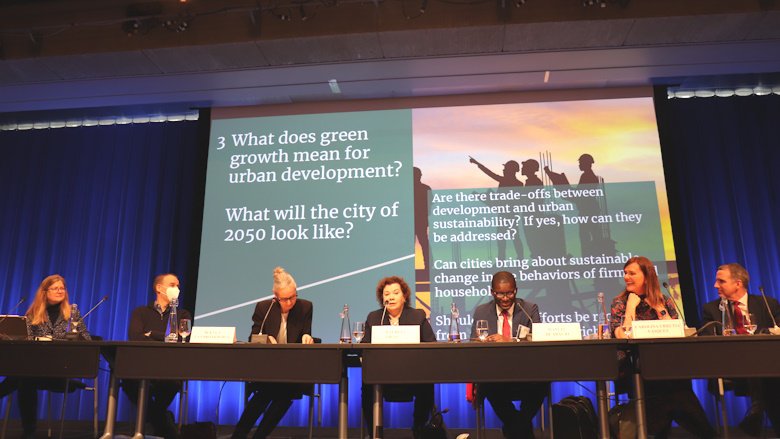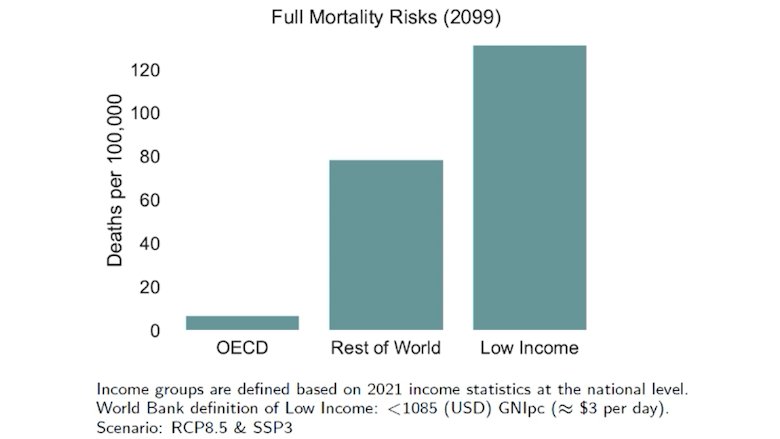Approximately 56 percent of the world��s population��or 4.4 billion individuals��lives in a city. The growth of cities is expected to continue, with the urban population more than doubling its current size by 2050, at which point nearly 7 in 10 people will live in cities. If well managed, rapid urbanization presents an opportunity for sustainable growth, increased productivity, and innovation. Sustainable cities offer both adaptation and mitigation benefits in the face of growing threats from climate change. If poorly managed, however, urban density can reduce wellbeing and exacerbate carbon emissions.
Following a three-year hiatus due to the COVID-19 pandemic, the Urbanization and Poverty Reduction Research Conference series returned earlier this year for its 7th iteration. The 7th Urbanization Conference focused on the topic of Climate Change and Sustainable Cities. Co-organized by the World Bank, , and the , a crowd of 300 attendees participated in-person at the World Bank��s Preston Auditorium. Eager for the series�� return, the conference also attracted online viewers from around the world and an audience of academics, development practitioners, policy makers, and students.
Figure 1: The Stage of the 7th Urbanization and Poverty Reduction Research Conference Opening Session
��This edition of the conference focuses on one of the most pressing challenges that��s facing cities today,�� said Aart Kraay, Deputy Chief Economist and Director of Development Policy at the World Bank. ��Climate change is exposing cities to extreme weather events and a wide variety of other slower-moving stresses.��
Michael Greenstone, Professor of Economics at the University of Chicago, underlined the extraordinary stakes involved in tackling climate change during the keynote address. Greenstone cited a metric called the Social Cost of Carbon (SCC), a summary measure of climate damages, as ��the most important number you��ve never heard of.�� New estimates of the SCC suggest current yearly emissions cause roughly $7 trillion in damages, or 7 percent of global GDP. Furthermore, the costs will be highly uneven��for example, mortality impacts are predicted to be dramatically higher in low-income countries than in OECD countries (Figure 2).
Figure 2: Mortality Impacts across Income Groups
New Research Is Tackling Three Key Urbanization and Climate Themes
To highlight some of the key challenges facing cities, the conference focused on three major areas of new research: (1) climate-induced migration, (2) city resilience to climate change, and (3) cities and climate change mitigation.
While climate change is a global process, the severity of impacts will vary greatly depending on where people live. Therefore, it is crucial to know which parts of the world are likely to be the most impacted by climate change. According to , Associate Professor at Tufts University, the negative economic effects of climate change will be most severe in poorer and hotter countries, while several colder regions may actually benefit from the impacts. Furthermore, climate and population impacts are correlated across countries: climate change and population growth will have their most damaging effects in similar places.
Low-income countries will bear the brunt of climate change impacts. With this in mind, Gharad Bryan, Lecturer in Economics at LSE, . By surveying over 7,000 households, Bryan found that respondents were very pessimistic and expect climate patterns to worsen over time and have a negative impact on their income. Despite this, respondents also expected that adaption would allow the income in their current occupation and location to keep increasing. These optimistic responses highlight the significant challenges policy makers face in helping populations prepare for potentially more extreme climate scenarios.
In urbanized areas around the world, cities look different than they have in the past, fundamentally changing the way people live. According to Nathaniel Baum-Snow, Professor at the University of Toronto, has led to an exponential increase in building height since 1975. In the past, North America and Western Europe dominated the ��global skyline�� in terms of skyscraper quantity. But since 1975 skylines have been rising in Asia, the Gulf, Latin America, and Eastern Europe, presenting the opportunity for rapid urbanization gains in other parts of the world.
However, by Remi Jedwab, Associate Professor at George Washington University, raises an important concern in this context: are skyscrapers being built in locations that will disproportionately suffer from climate change impacts? For example, Dubai is planning to build more skyscrapers than any other city in the next ten years. At the same time, Dubai is also predicted to face severe climate change impacts, with some predicting that the city will become uninhabitably hot for four months out of the year. This research raises crucial questions regarding the role that policy makers can play in ensuring that investments in urban infrastructure go to places that are sustainable in the long run.
Better models that incorporate the complex interactions between climate, people, and economies will be critical to better policymaking going forward. The conference highlighted two examples that highlight the advances made in modeling these complex interactions.
According to the Global Burden of Disease Project, airborne particulates are estimated to result in three million deaths per year��emphasizing the importance of policies to reduce particulate emissions. by Matthew Turner, Professor of Economics at Brown University, utilizes an Integrated Assessment Model describing particulate emissions, economic activity, and particulate dispersion. The model can help uncover the unintended consequences of policies��for example, restrictions on agricultural burning can prompt farmers to migrate to cities, increasing the population living in more polluted cities.
Similarly, Harris Selod, a Senior Economist in the World Bank��s Development Research Group, shared an that takes into account the complex interactions between policies, households, and climate-related shocks. The model focuses on the welfare impacts of floods in cities with formal and informal housing, answering questions such as: (1) what will happen in different parts of the city? (2) how will the city system respond to those risks? and (3) what policies can be implemented and how will the city respond to those policies? An open-source Python version of the model developed in partnership between the World Bank and the City of Cape Town is and adaptation to other cities.
Additional prominent speakers from academia and government touched on a range of related topics. Mini keynotes included presentations by Mushfiq Mobarak (Professor of Economics, Yale University) on rural-to-urban migration in developing economies, Lint Barrage (Associate Professor and Chair of Energy and Climate Economics, ETH Zurich) on municipal climate risks and policy opportunities, and Siqi Zheng (STL Champion Professor of Urban and Real Estate Sustainability, MIT) on cities and climate-change mitigation. Panels of experts with representatives from the city of Quelimane, Mozambique (Mayor Manuel de Ara��jo), the city of Bogot��, Colombia (Ms. Carolina Urrutia V��squez), the Regional Ministry of Accra (Honorable Emmanuel Clottey), the University of Maryland (Professor Maureen Cropper), Harvard University (Professor Edward Glaeser), and the Pakistan Administrative Service (Dr. Omar Masud) debated the best policy approaches to tackle these urgent challenges.
Kickstarting a New Wave of Research on Climate Change and Urbanization
In the 10 years since the , ��the Urbanization Conference series has become one of the most important conferences that links academics, policy makers, and students in the Washington, DC area with those in Africa, Asia, and Latin America,�� according to Alyssa Ayres, Dean of the Elliott School of International Affairs at George Washington University.
In its latest iteration, the 7th Urbanization Conference was not only a gathering of experienced researchers and policy makers, but also served to bring together some of the most promising young scholars in the field. On the second day of the conference, the Young Urban Economist Workshop engaged a group of six emerging researchers in the field of urbanization and connected them with policy makers from across the globe. Collaboration with a new generation of young economists is part of a broader effort to kickstart a new wave of research on climate change and urbanization while bringing fresh perspectives into the field.
How populous countries accommodate their fast-growing urban populations will make a profound difference to the lives and livelihoods of tens of millions. The interconnected challenges of urbanization and climate change ensure that the need for rigorous and innovative research in this area will continue to grow in the years ahead��a challenge that future Urbanization and Poverty Reduction Research conferences will strive to meet.


